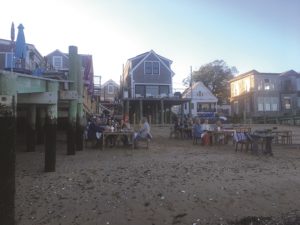PROVINCETOWN — The Colonial Ordinances of 1641-1647 are getting a lot of attention lately, both statewide and in the West End, where Sal’s Place has been serving diners on the beach behind its neighbor’s property since 2020.
Sal’s owner says she is exercising her right to use the intertidal land behind 101 Commercial St. The town’s zoning board of appeals granted her permission to do so in 2020 to provide safe seating during the pandemic.
Owner Siobhan Carew and her daughter, Michela Carew-Murphy, are in a drawn out legal tangle with the neighbor, Gregory Connors, who sued Sal’s Place in 2016 over the use of an easement between the properties and other issues.
This summer, Land Court Judge Michael Vhay issued an injunction barring Sal’s from using the beach behind Connors’s property. When the restaurant continued to seat customers there, Vhay found Carew in comtempt of court and levied fines. Vhay also ordered Carew to pay Connors’s legal fees.
But the battle is not over. On Sept. 9, an attorney working pro bono for the West End Racing Children’s Community Sailing club filed an amicus curiae, or friend of the court, brief arguing that the intertidal zone is not Connors’s property but belongs to the commonwealth. Town counsel Amy Kwesell filed a similar amicus curiae brief on Sept. 16.

Both Kwesell and attorney Karl Buch, who represents the sailing club and has a home on Point Street, pointed to Provincetown’s well-established relationship to those Colonial Ordinances.
While private property ownership in Massachusetts generally extends to the mean low water line, an exception was made for the area west of Howland Street in Provincetown. Here, private property extends only to the mean high water line, and the intertidal area is owned by the state.
This policy goes back to the founding of the Outer Cape towns, when the area east of Howland Street was part of Truro. The area to the west was known as the Province Lands. When Provincetown became a town in 1727, “the charter did not provide the new town with authority to grant land to its settlers … So, west of Howland Street, is Commonwealth tidelands,” according to the town’s website.
Carew’s attorney, Anthony Panebianco, tried to connect this history with the case in previous hearings. But Judge Vhay said the evidence was neither sufficient nor relevant. His concern was that the Carews had been violating his injunction all summer.
Nonetheless, the town and the West End Racing Club both want the judge to address Provincetown’s unique intertidal situation.
“The public’s ability to utilize the intertidal area in front of 83 Commercial Street is key to the success of the [West End Racing Club’s] program, and the general welfare of those in the community,” stated Buch in court documents.
The Provincetown ZBA is also a defendant, because it granted the beach seating permit in 2020. Until now, the town has largely stayed out of the dispute. “But due to the May 13 decision, subsequent injunctions, and rulings on contempt, the board and town now have an interest in ensuring that ownership of the intertidal zone is fully adjudicated because of the potential adverse effects of the current ruling to the town and its residents,” wrote Kwesell.
None of the attorneys would comment for this article.
The ability to swim and stroll on the bay would be greatly curtailed if Provincetown’s intertidal lands are found to be private property. But Vhay has not ruled on that matter, nor will he. Anything that would change the interpretation of land ownership in a precedent setting way would have to come from an appeals court, said Michael Fee, a Truro resident and attorney with Pierce & Mandell.
“You have to understand the way Land Court works,” said Fee. Vhay, he said, was asked to rule on a specific question based on the evidence before him. He ruled that the “defendants have not demonstrated a likelihood of success on the merits of their claims nor a substantial risk of irreparable harm in the absence of a preliminary injunction that outweighs any similar risk of harm to the plaintiff.”
When Panebianco tried to call Town Manager Alex Morse to testify in the contempt of court trial on Aug. 3, Vhay said Morse’s testimony was not relevant.
“The Carew Defendants may not re-litigate at the upcoming contempt trial the issue of who owns the intertidal zone,” Vhay stated.
The matter before Vhay now is simply how much Carew must pay Alan Lipkind, Connors’s attorney, who has submitted a bill for $88,820. Lipkind called the amicus brief by the sailing club “frivolous” and now seeks attorney fees from the club as well, according to court documents.
The question posed by the town and the sailing club would be properly handled in an appeals court once a final decision has been rendered in Land Court, Fee said.



